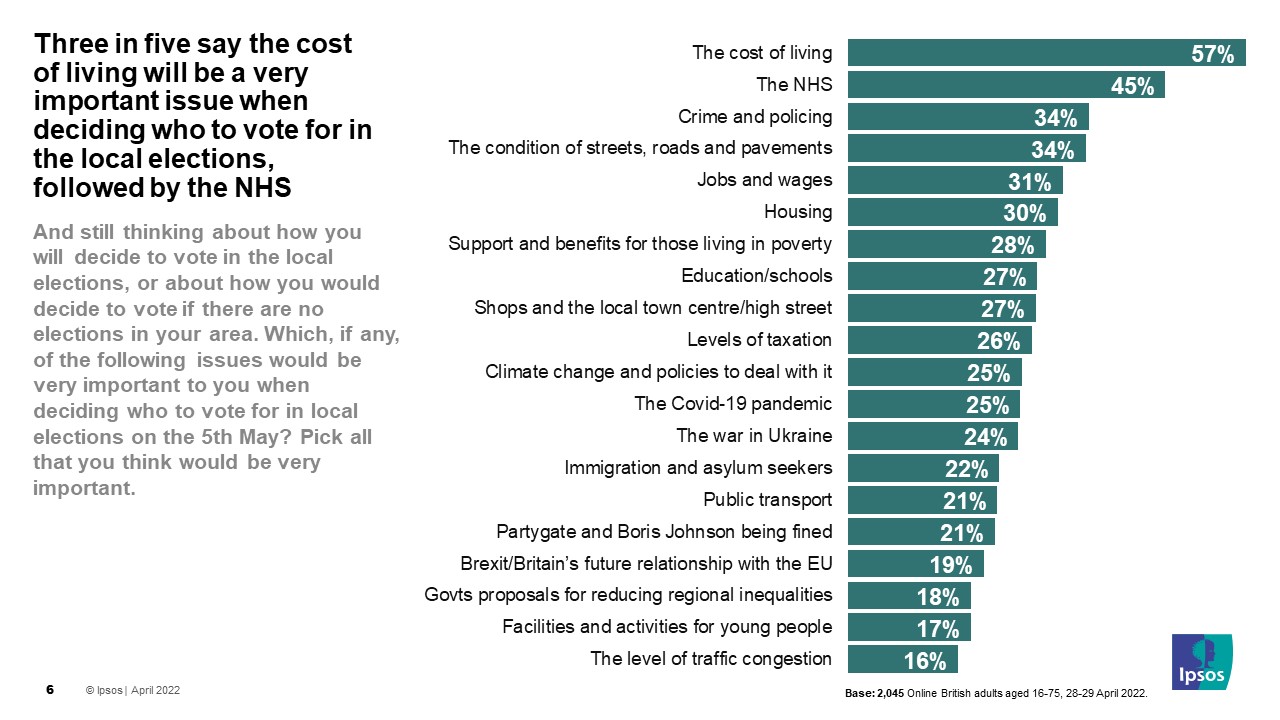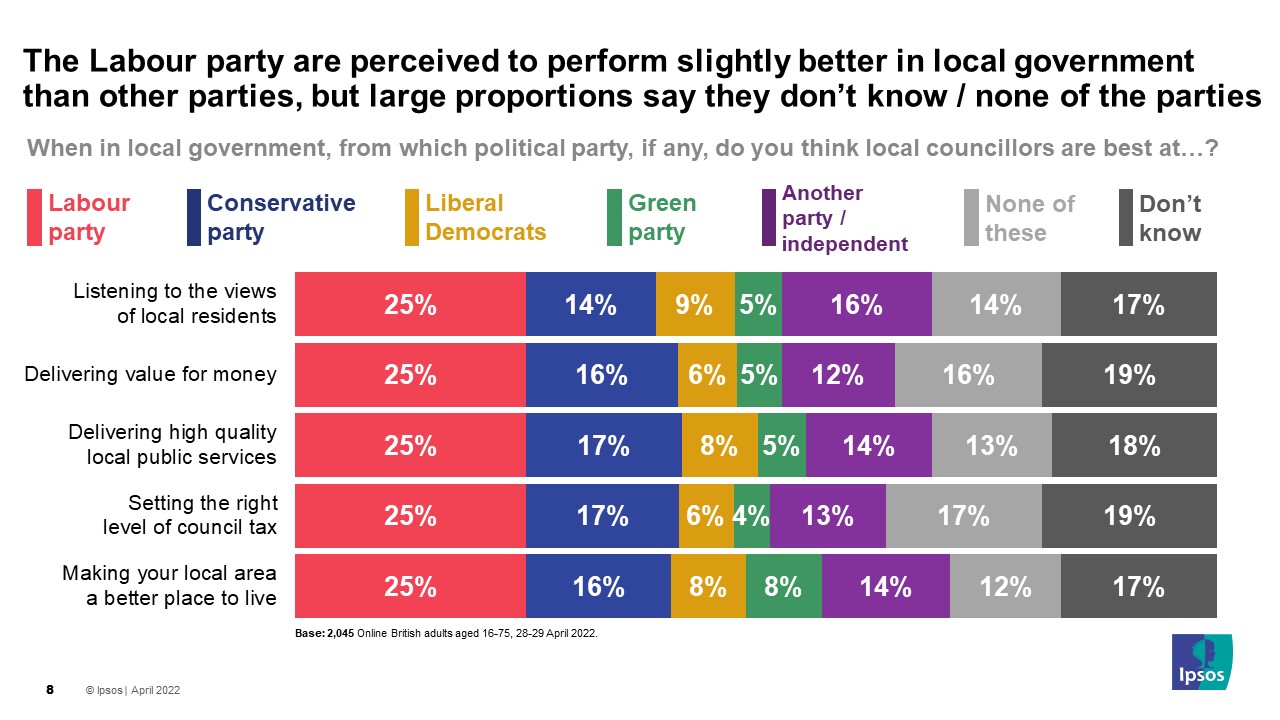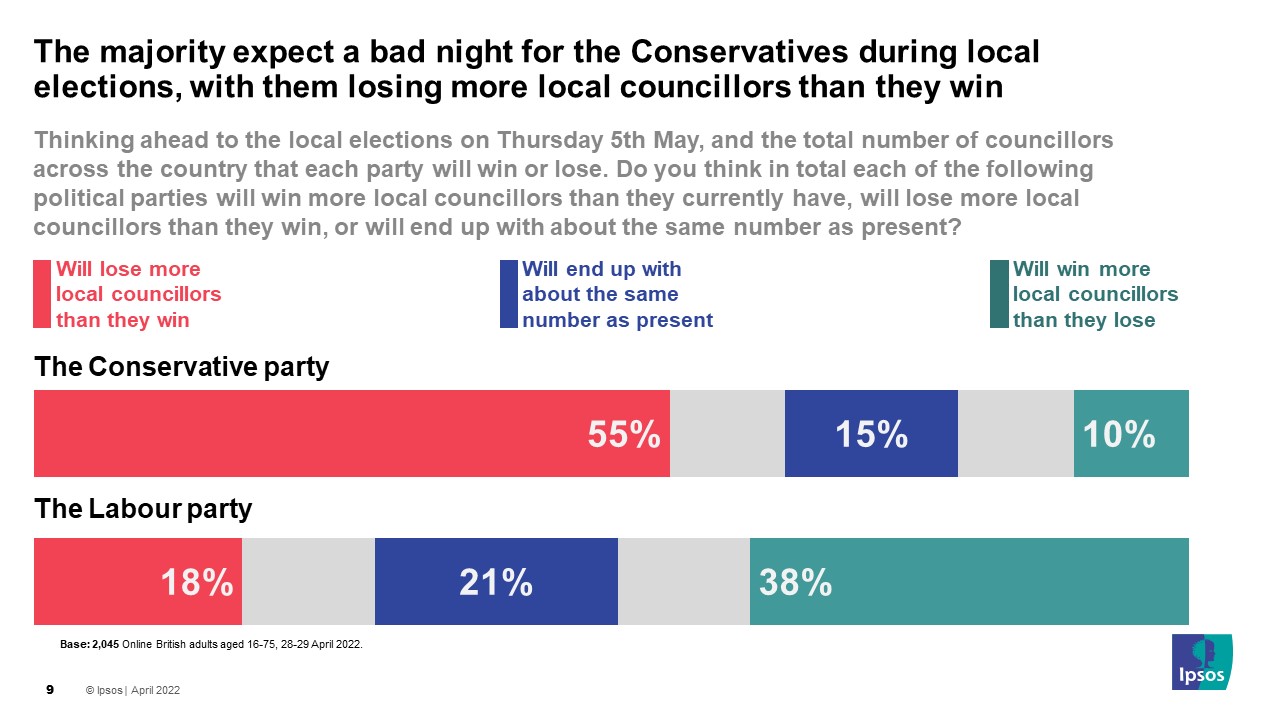Cost of living, NHS, crime and condition of streets would be most important in deciding how to vote in local elections
New research from Ipsos, ahead of the local elections taking place on 5th May, shows the cost of living crisis and the NHS would be important issues to Britons when it comes to how they vote. Almost 6 in 10 (57%) say the cost of living would be a very important issue while 45% say the NHS would be influential in their vote. (All survey participants were asked to think about what would be important to their vote, even if they don’t have local elections in their area.)

Looking more locally, around a third say crime and policing (34%), the conditions of roads and pavements (34%) and jobs and wages (31%) would be very important when deciding who to vote for. Fewer, but still around 1 in 4, would be influenced by other current issues such as climate change (25%), the Covid-19 pandemic (25%), the war in Ukraine (24%) or “partygate” and Boris Johnson being fined (21% - though this rises to 32% of 2019 Labour voters).
More broadly, Britons would base their decision on what local parties are promising to do in their area (46%) and how well the local council has run in their area over the past few years (45%). However, people are also paying attention to the national agenda, 41% say party policies on national issues would be important to them in deciding who to vote for while 39% would base it on how well the UK Government has run the country over the past few years. Britons are also just as likely to base their vote on national leaders (37%) as they are on candidates standing for local election in their area (35%).
Labour voters are significantly more likely to base their vote on how well the UK Government has run over the past few years, 51% of those who voted for Labour in 2019 say this would be very important to their vote compared with 36% of those who voted Conservative. Similarly, 47% of Labour voters say their opinions of national leaders would play a key part in their decision compared with 36% of Conservatives.
Around half of Britons say they are paying attention to news stories about local elections (51%) in comparison with 88% who are closely following stories about the rising cost of living and 84% who are following the Russian invasion of Ukraine. Around 7 in 10 are paying attention to stories about fines being issued as part of the police inquiry into Downing Street parties. There are signs though that people in London (65%) and the North of England (58%) are following the local elections more closely than people in other parts of England.
The Labour Party is perceived to perform slightly better in local government than the Conservatives, but no party comes out with particularly strong scores. A quarter (25%) say local councillors from Labour are best at listening to the views of local residents, delivering value for money, setting the right level of council tax, delivering high quality local public services and making local areas better. Meanwhile, between 14-17% say the same for Conservative councillors, and just under 1 in 10 for the Liberal Democrats. However, around 1 in 3 Britons say none of the parties or that they don’t know.

Just over half of Britons (55%) expect to see the Conservative Party lose more local councillors than they will win while only 15% expect them to end up with about the same number as present and 1 in 10 (10%) say they will win more local councillors than they will lose. Even among their own voters, 51% expect the Conservatives to lose more than win.

Hopes are slightly higher for the Labour Party, 4 in 10 (38%) expect them to make gains (rising to 54% of their 2019 voters) while 21% say they will keep about the same number of local councillors and only 18% expect them to make more losses.
Kelly Beaver, UK Chief Executive at Ipsos, said:
A mix of national and local factors will be occupying voters’ minds as they head into the booths for the local elections, but given concern about inflation and prices is at the highest Ipsos has recorded for decades it is little surprise to see the cost of living crisis impact the local picture as much as the national.
Looking ahead to the results, the public is pretty clear that they expect Labour to do better than the Conservatives, reflecting the small lead that Labour has in the national polls and on the key issue of the cost of living. Labour also has a slight advantage when it comes to perceptions of performance in local government, though in truth neither party is in a particularly strong position amongst the public here. In reality, the results from Thursday’s local vote won’t provide the last word on the standing of the parties nationally, particularly given likely levels of turnout. But they can have an important impact on party morale and will give vital clues to the direction of travel of Britain’s political geography.
Technical note:
- Ipsos interviewed a representative quota sample of 2,045 adults aged 18-75 in Great Britain. Interviews took place on the online Omnibus using the Ipsos.Digital platform on 3rd May 2022. Data are weighted to match the profile of the population. All polls are subject to a wide range of potential sources of error.






